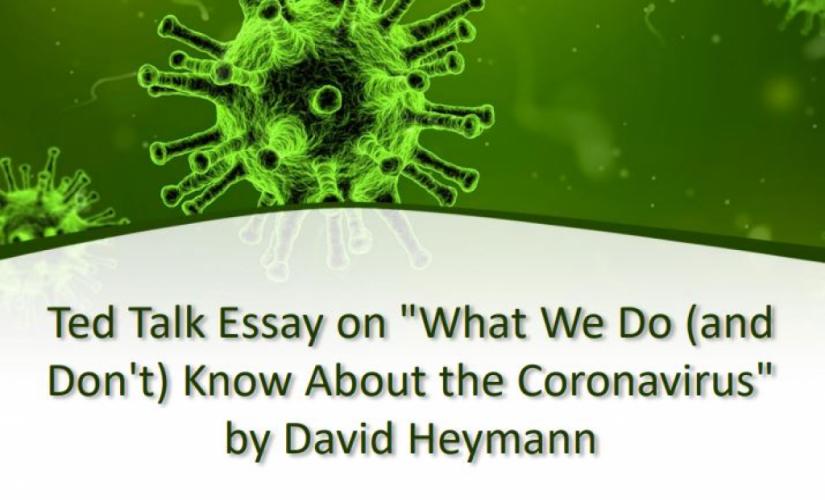Ted Talk is a medium that gives professionals a platform to give their views on various topical issues of concern to society. Basically, the platform has gained popularity because it is regarded as a source of information that many rely on for educational purposes. This Ted Talk essay on “What We Do (And Don’t) Know About the Coronavirus” is about a talk that Prof. David Heymann presents to his audience on the topic of coronavirus. According to the analysis, the talk was a great success because it adequately explored the topic in an informative, exhaustive, interesting, and persuasive manner.
The Main Theme
The talk was exhaustive and informative because it adequately explored the topic of coronavirus by providing all the necessary information. For example, coronavirus is a condition that originated in Wuhan China in 2019 (Sheikh and Roni par. 1). Since then, the disease has spread to different parts of the world, including America, Europe, Asia, and Africa. The speaker provides a comprehensive discussion of the virus. He explains how the disease began, how it has spread, its risk factors, symptoms, management, and prevention strategies, offering a structured narrative similar to a synthesis essay structure. Heymann emphasizes that the disease can be a great threat to people from developing countries because they have limited access to healthcare services (01:03-01:36). The speaker goes ahead to teach that the disease requires an immediate intervention since it has become a global issue. In order to prevent it, appropriate prevention measures must be taken. Such measures include handwashing, respiratory hygiene, isolation, and avoidance of crowds. The candid manner in which the speaker discussed all these points makes the speech to be quite educative, informative, and exhaustive to the audience who is interested in learning about the Coronavirus. It serves as a strong reference for how to start off a summary of an article effectively.

Using Rhetorical Appeals
The speech is persuasive because it involves the use of rhetorical appeals. Basically, the persuasion of a speech is determined by the use of ethos, logos, and pathos appeals (Hill and Jemma 6). The speech involved the use of ethos appeal since it was delivered by a credible speaker. Prof. Heymann is a credible authority because he is a renowned professor of Infectious Disease Epidemiology. He appeals to the audience since he has a wealth of knowledge and experience on infectious diseases like coronavirus. There was a logical appeal in the speech, as it is evidenced in the way in which the speaker fluently-articulated his ideas and explained them using real-life examples. The speech also involved the use of the pathos appeal. The pathos appeal is focused on the emotions of the audience (Rothwell 291). The speaker used pathos appeals on many occasions when delivering the speech. For instance, the use of statistics on the causation, impacts, and the severity of the disease appealed to the audience and evoked their emotional feelings. The use of the pathos, logos, and ethos appeals made the speech to be persuasive and convincing.
Conclusion
In conclusion, Prof. Heymann used the video to present an amusingly-informative, exhaustive, interesting, and persuasive talk on the theme of coronavirus. Basically, the speech was a great success since it was delivered perfectly. It was worth watching as it touches all the important issues regarding the deadly disease. The talk was persuasive enough because it employed a proper usage of pathos, ethos, and logos appeals.
Works Cited
Heymann, David. “What We Do (and Don’t) Know About the Coronavirus.” TED, 2020, www.ted.com/talks/david_heymann_what_we_do_and_don_t_know_about_the_coronavirus.
Hill, Oeppen, and Helen Jemma. “Logos, Ethos, Pathos and the Marketing of Higher Education.” Journal of Marketing for Higher Education, vol. 29, no. 2, 2019, pp. 1-18, doi: 10.1080/08841241.2019.1683120.
Rothwell, J. Dan. Practically Speaking. New York: Oxford University Press, 2019.
Sheikh, Knvul, and Caryn Rabin Roni. “The Coronavirus: What Scientists Have Learned So Far.” New York Times, 5 March 2020, www.nytimes.com/article/what-is-coronavirus.html.


